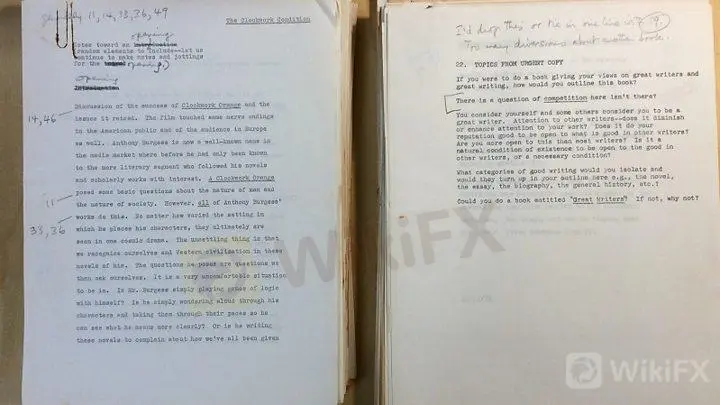简体中文
繁體中文
English
Pусский
日本語
ภาษาไทย
Tiếng Việt
Bahasa Indonesia
Español
हिन्दी
Filippiiniläinen
Français
Deutsch
Português
Türkçe
한국어
العربية
Unseen Clockwork Orange 'sequel' by Anthony Burgess unearthed
Abstract:Media playback is unsupported on your device Media captionA Clockwork Condition is a collection of

Media playback is unsupported on your device
Media captionA Clockwork Condition is a collection of Burgess' thoughts on the human condition
{2}
A previously unseen manuscript for a follow-up to writer Anthony Burgess's novel A Clockwork Orange has been unearthed in his archive.
{2}
A Clockwork Condition, which runs to 200 pages, is a collection of Burgess' thoughts on the human condition and develops the themes from his 1962 book.
The novel told the story of the state's attempt to cure a teenage delinquent.
The unfinished non-fiction follow-up is described as “part philosophical reflection and part autobiography”.
Image copyrightGetty ImagesImage caption Malcolm McDowell played violent delinquent Alex in A Clockwork Orange
In it, Burgess also addressed the controversy surrounding director Stanley Kubrick's 1971 movie adaptation of A Clockwork Orange.
The cult film, starring Malcolm McDowell as Alex, the violence-obsessed central character and narrator, was accused of inspiring violent copycat crimes and was banned by local councils in the UK.
It was only after Kubrick's death in 1999 that the film was re-released in UK cinemas and made available for home viewing.
A Clockwork Orange was, however, a box office success in the US and was nominated for the Oscar for best picture in 1972 (losing to The French Connection).
Burgess archive yields lost gems
The manuscript for A Clockwork Condition was never published and was found among papers at Burgess's house in Bracciano, near Rome.
When the house was sold after the writer's death in 1993, the archive was moved to Manchester, where it is being catalogued by the International Anthony Burgess Foundation.
Burgess himself described the work as a “major philosophical statement on the contemporary human condition”, outlining his concerns about the effect on humanity of technology, in particular media, film and television.
Image copyrightGetty ImagesImage caption Manchester-born Burgess's A Clockwork Orange remains his best known work
It also explains the origins of his novel's unusual title.
“In 1945, back from the army,” an extract reads, I heard an 80-year-old Cockney in a London pub say that somebody was 'as queer as a clockwork orange'.
“The 'queer' did not mean homosexual: it meant mad... For nearly twenty years I wanted to use it as the title of something... It was a traditional trope, and it asked to entitle a work which combined a concern with tradition and a bizarre technique.”
Prof Andrew Biswell, director of the International Anthony Burgess Foundation, said: This remarkable unpublished sequel to A Clockwork Orange sheds new light on Burgess, Kubrick and the controversy surrounding the notorious novel.
“The Clockwork Condition provides a context for Burgess's most famous work, and amplifies his views on crime, punishment and the possible corrupting effects of visual culture.”
Prof Biswell, who is also professor of English at Manchester Metropolitan University, said the author abandoned the manuscript when he came to realise “he was a novelist and not a philosopher”.
He then published a short autobiographical novel tackling some of the same themes, The Clockwork Testament, in 1974.
On Friday, the Design Museum in London launches a major Stanley Kubrick exhibition, which will include material from his Clockwork Orange film.
Follow us on Facebook, on Twitter @BBCNewsEnts, or on Instagram at bbcnewsents. If you have a story suggestion email entertainment.news@bbc.co.uk.
Disclaimer:
The views in this article only represent the author's personal views, and do not constitute investment advice on this platform. This platform does not guarantee the accuracy, completeness and timeliness of the information in the article, and will not be liable for any loss caused by the use of or reliance on the information in the article.
WikiFX Broker
Latest News
Attention! Goldman Sachs Cuts Gold Target to $2910
Inflation Rebounds: ECB's Big Rate Cut Now Unlikely
Carney \considering\ entering race to replace Canada\s Trudeau
High-Potential Investments: Top 10 Stocks to Watch in 2025
US Dollar Insights: Key FX Trends You Need to Know
Why Is Nvidia Making Headlines Everywhere Today?
Discover How Your Trading Personality Shapes Success
FINRA Charges UBS $1.1 Million for a Decade of False Trade Confirmations
Pepperstone Sponsored the "Aston Martin Aramco Formula One Team"
ACY Securities Integrates MetaTrader 5 to Enhnace Copy Trading Service
Currency Calculator






